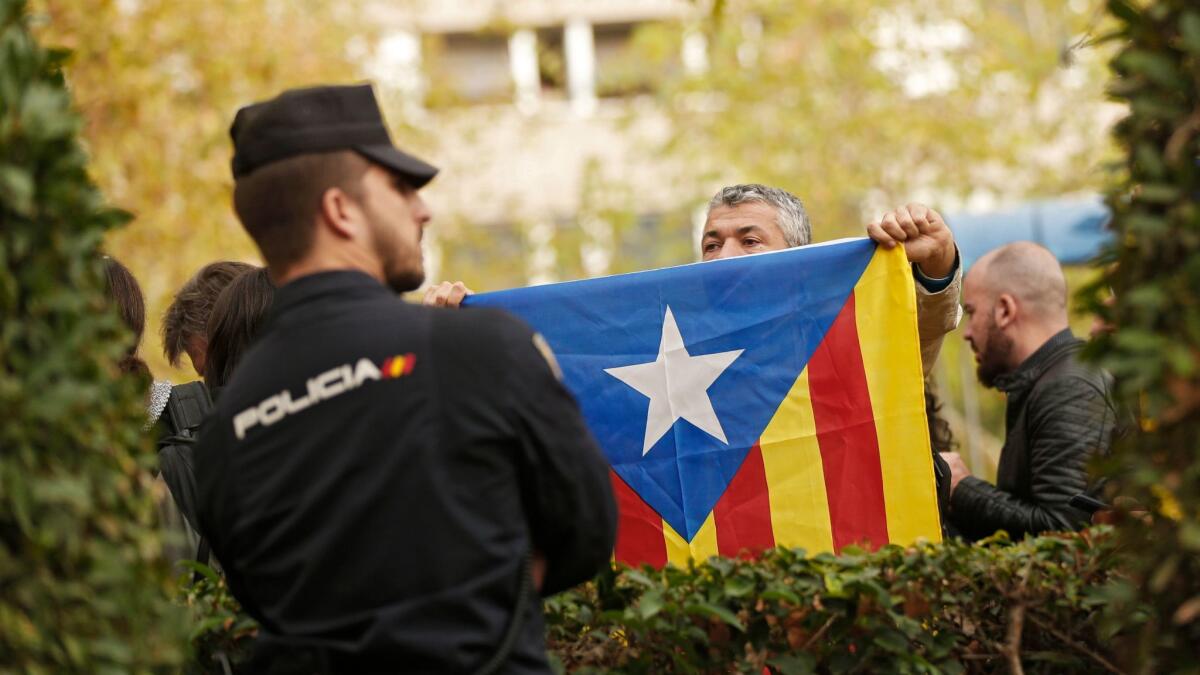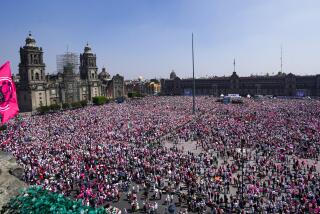Catalonia’s push for independence roils larger — and poorer — regions of Spain

Luis Zorrilla Sanchez starts most of his days at 5 a.m. and works until 9 at night, selling fruit at a small shop in this iconic southern Spanish city.
The 62-year-old has worked as a fruit vendor for more than three decades, resting only on Sundays and some holidays and during siesta, the two-hour period when stores close down so their owners can go home for lunch.
“Andalusians like fiesta, but they also work hard,” he said, referring to residents of Andalusia, Spain’s most populous autonomous region.
Sanchez, like other Seville residents, takes offense at the independence movement in the prosperous northeastern region of Catalonia, whose proponents argue that the central government takes a disproportionate amount of tax money from them for redistribution to other parts of the country.
To that end, independistas use the slogan “España nos roba,” or “Spain robs us,” as a rallying point for their cause.
For some Andalusians, the push for Catalan independence is a stinging rebuke of all Spaniards, particularly those who reside in less well-off regions.
“We are angry,” said Javier Martín, 55, a lecturer of business at the University of Seville. “Behind this nationalist feeling there is a big base of supremacism. They feel better than the other.”
In Andalusia, where more than 8 million people live, about 25% of residents are unemployed, according to Spain’s National Statistics Institute. Forty-two percent are at risk of poverty, according to the Andalusian Network to Fight Poverty and Social Exclusion.
Catalonia, where 7.5 million people reside, is an economic hub for Spain, accounting for 19% of the country’s gross domestic product despite representing 16% of the population. The region’s unemployment rate is about 12.5%, lower than the national average of 16.4%.
For Juan Luis Pavón, the separatists’ desire to be independent comes from a position of privilege.
“I think in all of Europe, the regions where there are independence movements are the rich regions, not the poor ones,” said the journalist and organizer of the initiative Sevilla Abierta, which advocates for social change in Seville.
The independence movement has put Andalusian leaders on the defensive. In September remarks, Andalusia’s top government leader, socialist Susana Díaz , said it was “absolutely clear that Andalusia is not less than Catalonia, or the Basque Country, or Galicia,” referring to other autonomous regions with separatist strains.
Díaz voted to support efforts from the central government in Madrid to crack down on Catalan leaders seeking independence.
The Spanish government called Catalonia’s secessionist drive illegal and ousted its top leaders Friday after the region’s parliament declared independence. The government summoned the region’s Cabinet members to court Thursday for possible charges of rebellion, but ousted Catalan President Carles Puigdemont, who is in Belgium, refused to comply. Prosecutors asked a judge to issue an international arrest warrant for Puigdemont and four regional ministers.
“Puigdemont is an idiot,” Zorrilla Sanchez said. “Look at him. He just left. First he’s in Brussels, and then it will be jail.”
In Seville, the capital of Andalusia, support for Spanish unity is evident. The red and and yellow national flag is everywhere: draped over balconies, hung on equipment at construction sites, inundating social media profile photos.
Over a late afternoon lunch, University of Seville tax law professor Rocío Lasarte scrolled through the messaging application WhatsApp on her cellphone, shaking her head at how many of her contacts had changed their photos to the Spanish flag.
Her colleague Cristina Borra, an economics professor, said she has to turn the television off at home because her husband becomes too angry when listening to the news and learning about how some independistas characterize other Spaniards.
“All day they are critical of the rest of Spain,” she said of independistas. “They say we are lazy, that we never work.”
Carmen Pino, 76, was quick to defend the work ethic of Andalusians as she took a walk around a central Seville neighborhood in the waning October light.
“We are workers. Fighters for our land. Businesspeople. We are professional people,” she said.
The former hospital worker, who has split her time living in Galicia and Seville, bemoaned the independence movement for not understanding the dangers of division — Spain suffered through a civil war in the 1930s.
“This is a disaster. It’s crazy. Spain is one. It’s not independent pieces,” she said.
Martín, the business lecturer, contended that Catalonia’s Oct. 1 independence referendum was illegitimate because only a small part of the country — 42% of Catalans — cast a vote. He pointed to an article of Spain’s Constitution that reads, “National sovereignty belongs to the Spanish people,” and signifies to him that the whole nation has the right to decide the fate of Catalonia.
Juan Antonio Jara, 51, said he is frustrated with both sides, the independistas and the unionists. When he stayed at a hotel in the city of Almeria recently, he noticed Spanish flags were draped over the first-floor balconies. When he asked the hotel who had put up the flags, a receptionist told him hotel employees had done so — without consulting guests — to show support for a united Spain.
“It’s a confrontation of Catalan nationalism versus Spanish nationalism,” Jara said.
The issue of Catalan independence is far from new. A political party advocating a separate Catalan state has existed since 1922, and over the decades, the movement has fluctuated in strength, with last month’s events bringing debate over independence to a climax.
Lasarte said she was “bored” of hearing about Catalonia. Noelia Vega, 31, said there are other issues in the country that demand attention.
“Spain has a more important crisis. Health, education,” said Vega, who hails from the Canary Islands but studied in Seville. “Everyone is talking about Catalonia, but there are other problems.”
Martín also acknowledged he was growing weary of conversation about the crisis.
He predicted the scene that would happen with his friends the following night at a soccer match between Sevilla Futbol Club and the Russian team Spartak Moskva. They would watch the game, and, in typical Andalusian fashion, go out for beers for several hours afterward. Although they would begin by talking about the match, the conversation would eventually turn to politics.
“We’ll forget the match,” Martín said, sighing. “And that’s not fair.”
More to Read
Start your day right
Sign up for Essential California for news, features and recommendations from the L.A. Times and beyond in your inbox six days a week.
You may occasionally receive promotional content from the Los Angeles Times.






